Historia de CISEN
Las redes LANES, PROAGUA y VESPLAN fueron creadas con el propósito generar una agenda común de investigación en el tema de Servicios Ecosistémicos (SE) y vincular diferentes actores con influencia en la toma de decisiones en este campo de trabajo. Los países vinculados a través de dichas redes son: Argentina, Bolivia, Brasil, Chile, Colombia, Costa Rica, México, Nicaragua, Paraguay, Perú, Uruguay, además de Cuba como representante del Caribe y España. En el marco de estas redes se realiza periódicamente el CONGRESO INTERNACIONAL DE LOS SERVICIOS ECOSISTÉMICOS EN LOS NEOTRÓPICOS. Las tres primeras versiones fueron realizadas en los años 2006 (Valdivia, Chile), 2011 (Asunción, Paraguay) y 2013 (Medellín, Colombia).
El primer Congreso realizado en Noviembre de 2006 (Valdivia, Chile) fue organizado por el Núcleo Científico FORECOS de la Universidad Austral de Chile. En este congreso se presentaron 108 trabajos y asistieron 121 investigadores y estudiantes de 13 países de Latinoamérica, además de Estados Unidos y de otros países del mundo. Uno de los acuerdos del primer Congreso fue promover el avance científico, la difusión, el diálogo con las autoridades y la colaboración internacional en el tema de los SE, los cuales son fundamentales para asegurar el bienestar a las personas y el desarrollo social en los países de la región. Como parte de estas acciones de seguimiento surge el Segundo Congreso Internacional de Servicios Ecosistémicos de los Neotrópicos.
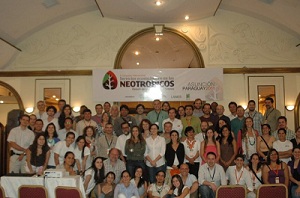
La segunda versión del congreso fue realizada en Noviembre de 2011 en Asunción (Paraguay) y organizada por la Fundación Moisés Bertoni. Esta edición permitió establecer los últimos avances en la investigación sobre el tema de SE en América Latina y el Caribe, y promovieron la discusión y reflexión entre 75 participantes de 12 países sobre los diferentes retos que requieren su incorporación en las agendas de trabajo de otros actores institucionales y sociales. Además de evidenciar los avances presentados en temas de mapeo, evaluación y valoración de funciones y servicios ecosistémicos, a manera de conclusión se plantearon los desafíos para la investigación y toma de decisiones en este marco de trabajo. Algunos de estos desafíos son:
- Mejorar el entendimiento de los patrones temporales de la provisión de los SE a diferentes escalas.
- Desarrollar métodos de evaluación de la apropiación de los SE (o de sus beneficios) y su distribución dentro de la sociedad, y su aplicación a situaciones reales.
- Revisar y difundir las experiencias exitosas en la integración de investigación y toma de decisiones comprendiendo a los SE.
- Establecer las condiciones bajo las cuales la valoración económica de los SE resulta pertinente y útil.
- Contextualizar espacial y temporalmente los estudios, teniendo en cuenta que los SE están inmersos en un entorno político, social y cultural complejo y dinámico en cuanto a las relaciones entre sus componentes. En este sentido resulta especialmente necesario entender los intereses que dan lugar a los conflictos en el uso de los ecosistemas y los recursos naturales que repercuten en los SE y la apropiación de sus beneficios.
- Avanzar en el análisis de la vulnerabilidad ante la pérdida de SE.
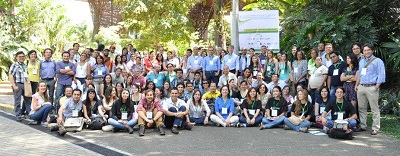
El Tercer Congreso, realizado en Medellín (Colombia), fue organizado por la Universidad Nacional de Colombia (Sede Medellín), la Universidad de Antioquia, las redes LANES, PROAGUA y VESPLAN, el grupo FORECOS y Conservación Internacional - Colombia. Tuvo como objetivo establecer los últimos avances en la investigación sobre el tema de los SE en América Latina y el Caribe, promover la discusión y reflexión entre los expertos de los países miembros, identificar los retos para su incorporación en las agendas de trabajo de otros actores institucionales y sociales. Esta versión se realizó del 6 al 12 de Octubre del año 2013 con participación de 230 personas entre investigadores, actores institucionales, estudiantes entre otros. Los asistentes provinieron de países como Alemania, Argentina, Aruba, Australia, Brasil, Chile, Cuba, Ecuador, España, Estados Unidos, Guatemala, Holanda, México, Paraguay, Perú y República Dominicana. Se contó además con el aporte científico de 10 expertos internacionales, los cuales abordaron el tema desde diferentes perspectivas como el ordenamiento territorial, la vulnerabilidad y el riesgo, la valoración económica y el mapeo de servicios. Durante esta versión se presentaron 60 ponencias orales y 13 póster. Estos trabajos presentaron revisiones y propuestas para el abordaje de los marcos conceptuales y metodológicos, así como experiencias aplicadas en las diferentes áreas temáticas del congreso. Se contó, además, con la presencia de representantes latinoamericanos de la organización Conservación Internacional, a través de una sesión plenaria donde se analizaron las experiencias regionales en la incorporación del tema de los SE y se evidenciaron las posibilidades de la instalación del mismo en las agendas de gobiernos de la región.
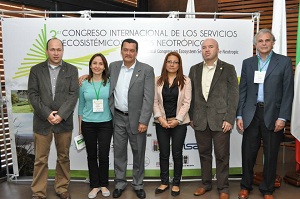
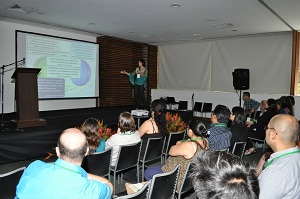
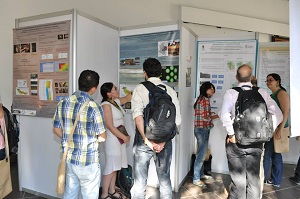
LINEAS TEMÁTICAS ABORDADAS EN LOS CONGRESOS INTERNACIONALES DE 2006, 2011 Y 2013
Primer Congreso
- Monitoreo y cuantificación de SE tales como la regulación hídrica, producción de agua, control de la erosión, recreación, captura de carbono, conservación de la biodiversidad y retención de nutrientes.
- Impactos del cambio climático y de disturbios.
- Valoración económica.
- Restauración ecológica.
- Políticas públicas.
- Aspectos culturales y sociales.
- Educación y extensión.
- Métodos y aproximaciones transdisciplinarias.
Segundo Congreso
- Evaluación física y mapeo de SE.
- Experiencias de Pago de Servicios Ambientales (PSA) y su impacto socio-económico.
- Impacto del cambio climático y cambio de uso del suelo sobre la provisión de SE.
- Recuperación de SE a través de la restauración ecológica.
- Comunicación social en relación a los SE.
- Incorporación de los SE en las políticas públicas y en la toma de decisiones.
Tercer Congreso
- Evaluación de funciones y servicios ecosistémicos: medición, monitoreo y mapeo.
- Valoración económica y social: mapeo de beneficios, valoración económica de beneficios, procesos de valoración socio-cultural de SE, estimación de compromisos (trade-offs).
- Riesgo y SE: mapeo y medición de riesgo de los ecosistemas a la pérdida de funciones ecosistémicas, riesgo de la sociedad a la pérdida de SE.
- Toma de decisiones y formulación de políticas públicas: ordenamiento territorial, planificación de cuencas hidrográficas, aplicación y diseño de incentivos o políticas para el manejo de SE.
- SE y sociedad: experiencias de educación ambiental en el tema de servicios, experiencias a nivel local y/o regional en la conservación de SE en los que participe la comunidad, experiencias de socialización, divulgación y/o sensibilización a la sociedad.
